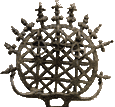| |
ÖZET
Kırgız Türkçesinde sorular temel olarak soru kelimeleri, soru parçacıkları ve vurgu vasıtasıyla yapılır. Kırgız Türkçesinde kim ”kim”, emne “ne”, kayda “nerede”, kança “kaç”, kaçan “ne zaman” vb. soru kelimeleriyle yapılan sorulara nk-soruları denir. Bağlam ve vurguyla bağlantılı olarak şüphe, merak, tehdit, yargı, alay, heyecan, aşağılama, yerme, izin isteme, rica, tavsiye, öneri, emir gibi anlamları da bildirebilen nk-sorularının temel işlevi bilgi almaktır. Bu bilgi sorunun cevabı vasıtasıyla sağlanır. Soru incelemelerinde sorular kadar cevaplar da önemlidir. Çünkü sorunun gerçek anlam ve işlevi cevabı ile ortaya çıkmaktadır. Soru türüne göre cevaplanma şekli de değişmektedir. Nk-soruları bilgi isteyen sorular olduğu için mutlaka cevap bekler. Nk-sorularının basit nk-soruları, çoklu nk-soruları, yansımalı nk-soruları, retorik nk-soruları ve nk-bildirme soruları olmak üzere farklı türleri vardır. Bu soru türlerinin olumlu-olumsuz ve gerçek-sözde oluşlarına göre cevaplanma şekilderi de değişebilmektedir. Ayrıca nk-sorularında soruyu soranın verdiği cevaplar ve cevaba karşı verilen cevaplar da görülmektedir.
ANAHTAR SÖZCÜKLER
Kırgız Türkçesi, nk-soruları, nk-sorularının cevapları.
ABSTRACT
In Kirghiz Turkish, interrogatives are basically made via question words, question fragments and stress. In Kirghiz Turkish, interrogatives made with question words such as kim “who”, emne “what”, kayda “where”, kança “how much”, kaçan “when” etc. are called wh- questions. Considering the context and the stress, the basic function of wh- questions is to elicit information as well as involving such meanings as suspicion, curiosity, threat, judgement, mockery, excitement, insultation, satire, asking for permission, request, advice, suggestion, and giving commands. This information is obtained by means of the answer of the question. In the analysis of interrogative, answers are as significant as questions, because the real meaning and the function of the question can be obvious only after the answer itself. The way answer is given is determined by the question type. Wh-questions definetely require an answer since they are formed to get information. Wh-questions can be divided into several types including simple, multiple, echo, rhetoric and declarative wh-questions. The way these question types are answered depends on their being affirmative or negative and active or passive. In addition, in wh- questions, it is possible to see the answers given by the questioner and the answers given as a response.
KEY WORDS
Kirghiz Turkish, wh-questions, answers of wh-questions.
KAYNAKLAR / BIBLIOGRAPHY
ABDUVALİYEV, İ., T. SADIKOV, (1997) Azırkı Kırgız Tili, Bişkek.
ALONI, Maria, Alastair BUTLER, Paul DEKKER, (2007) Questions in Dynamic Semantics, Emerald Group Publishing.
ÅQVİST, Lennard, (1973) “Modal Logic with Subjunctive Conditionals and Dispositional Predicates”, Journal of Philosophical Logic 2, pp. 1-76.
AJDUKİEWİCZ, Kazimierz, (1974) Pragmatic Logic, Reidel.
BAYTOK, Aysel, (2013) Kırgız Türkçesinde Soru, Yayınlanmamış Doktora tezi, Ankara.
BELNAP, N. D., (1969a) “Åqvist’s corrections-accumulating question sequences”, in Philosophical Logic, ed. J. W. DAVIS, pp. 122-134.
BELNAP, N. D., T. B. STEEL, (1976) The Logic of Questions and Answer, London.
BELNAP, N. D., (1983), “Approaches to the semantics of questions in natural language (I)”, Meaning, use, and interpretation of language, ed. R. BAUERLE, C. SCHWARZE, A. von STECHOW, Walter de Gruyter, pp. 22-29.
CAPAROV, A., (1979) Kırgız Tilinin Sintaksisi, Frunze.
GALAMBOS, James, A., John B. BLACK, (1985) “Using Knowledge of Activities to Understand and Answer Questions”, The Psychology of Questions, ed. Arthur C. GRAESSER, John B. BLACK, London, pp. 157-191.
GINZBURG, Jonathan, (1992) “Questions Without Answers, Wh-Phrases Without Scope: A Semantics for Direct Wh-Questions and Their Responses”,in Stuation Theory and its Applications, ed. Robin COOPER, Kuniaki MUKAI, Jon BARWISE, John PERRY, CSLI.
GINZBURG, Jonathan, Ivan A. SAG, (2000) Interrogative Investigations, Stanford, California.
GREEN, N., S. CARBERRY, (1992) “Conversational implicatures in indirect replies”, Proceedings of the 30th Annual Meeting of the Association for Computational Linguistics, pp. 64–71.
GRAESSER, A.C., (1985) “An Introduction to the Study of Questioning”, The Psychology of Questions, ed. Arthur C. GRAESSER, John B. BLACK, London, pp. 1-14.
HAGSTROM, P. (2003) What questions mean, Glot International, V. 7/8, September/ October, ss. 188-201.
HAMBLIN, C.L., (1958) “Questions”, Australian Journal of Philosophy, 36, pp. 159-168.
HAMBLIN, C.L., (1971) “Mathematical models of dialogue”, Theoria, 37: 130-155.
HAN, Chung-hye, (2000) The Structure and Interpretation of Imperatives: mood and force in universal grammar, Routledge.
HARRAH, David, (1963) Communication: A Logical Model, MIT Press, Cambridge.
HARRAH, David, (1984) The Logic of Questions.
HARRAH, David, (2002) “The Logic of Questions”, in Handbook of Philosophical Logic, ed. Dov M. GABBAY, Franz GUENTHNER, C. 8.
HEBERT, Raymond J., Nikolas POPPE, (1963) Kırghız Manual, Indiana University, Bloomington.
HIGGINBOTHAM, James, (2003), “Interrogatives”, In Semantics: Critical Concepts in Linguistics, ed. Javier GUTIERREZ-REXACH, Routledge, pp. 386-417.
HIGGINBOTHAM, James, (1996) “Interrogatives”, In The view from building 20: essays in linguistics in honor of Sylvain Bromberger, ed. Keneth Hale and Samuel Jay Keyser, Third printing, pp. 119-228.
HINTIKKA, J. (1983) “New Foundations for a Theory of Questions and Answers”, in Questions and Answers, ed. F. KIEFER, pp. 159-190.
HUALDE, Jośe Ignacio, (1992) Catalan, Routledge.
KARTTUNEN, Lauri, (1977) “Syntax and Semantics of Questions”, in Linguistics and Philosophy, V. 1, Issue 1, pp. 3-44.
KIRGIZ Adabiy Tilinin Grammatikası, (1980) red. C. KUDAYBERGENOV, Kırgız İlimder Akademiyası Til cana Adabiyat İnstitutu, Frunze.
KIRGIZ Tilinin Grammatikası, (1964) Kırgız İlimder Akademiyası Til cana Adabiyat İnstitutu, Frunze.
KORNFİLT, J., (1997) Turkish, Routledge.
KUBIŃSKI, T., (1980) An Outline of the Logical Theory of Questions, Akademie Verlag, Berlin.
PIWEK, Paul, (1997) What is Answer? That is Question, IPO/TUE: Center for Research on User-System Interaction, The Netherlands.
ROHDE, Hannah, (2006) “Rhetorical Questions as Redundant Interrogatives”, San Diego Linguistic Papers, Issue 2, Paper 7, University of California, pp. 134-168.
TESCHNER, Richard, V., Eston Earl EVANS, (2007) Analyzing the Grammar of English, Georgetown University Press.
WIŚNIEWSKI, Andrzej, (1995) The Posing of Questions, Dordrecht, Boston, London.
WIŚNIEWSKI, Andrzej, (1997) “Some Foundational Concepts of Erotetic Semantics”, in Knowledge and Inquiry, ed. Matti Sintonen, Amsterdam, Atlanta, pp. 181-212.
Yazışma / Correspondence:
Aysel Baytok,Yrd. Doç. Dr., Pamukkale Üniversitesi, Fen-Edebiyat Fakültesi, Çağdaş Türk Lehçeleri ve Edebiyatları Bölümü Öğretim Üyesi.
Adres: Pamukkale Üniversitesi, Fen-Edebiyat Fakültesi, Çağdaş Türk Lehçeleri ve Edebiyatları Bölümü, B-Blok, Kat 1, Kınıklı kampüsü, Pamukkale (Kınıklı) / DENİZLİ
E-posta:ayselbaytok@gmail.com
Alındığı Tarih/Received Nisan/April 30 2013
|
|
|

